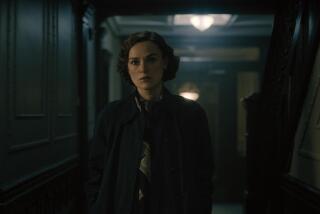MOVIE REVIEW : STALKING PROS OF CON IN A ‘HOUSE OF GAMES’
- Share via
The atmosphere in David Mamet’s coldly absorbing romantic thriller “House of Games” (opening Friday at selected theaters) is as dry as an air-conditioned waiting room, or dust rising above a mahogany bar at 8 a.m.
It’s almost as dry as remembered sin. In weaving this little tale of Seattle con men working in tacky tavern back rooms, Mamet gives us the plot in crisp layers--peeling them back before the audience and one enthralled witness in the movie.
This kibitzer, Dr. Margaret Ford (Lindsay Crouse), is pulled in by curiosity and desire. The con games she watches are like movements in a sonata: We get the setup, the hook, repetitions, variations, completion. Then they start again--con succeeds con, game succeeds game. Finally, the characters are swimming in their own elaborate fix and only passion, desperation, one last shot to the heart, can sink it.
Mamet, the excellent playwright (“American Buffalo,” “Glengarry Glen Ross”) and screenwriter (“The Verdict,” “The Untouchables”) making his directorial debut here, dips all this in a kind of film noir paste--an abstracted, nearly de-culturated noir. His cinematographer, Juan Ruiz Anchia, is capable of spectacular colorations, but in this film he keeps everything to a muted, played-out-looking palette. And the world that palette reveals is just as muted, just as played out.
In the movie, Crouse’s Ford is a clinical psychiatrist and best-selling writer whose specialty is obsessive behavior. Treating a compulsive gambler who confesses to running up a dangerous debt, she pays a visit to the man who holds his mark, Mike (Joe Mantegna), at his hangout, the House of Games. Immediately she gets sucked in by Mike’s oily eyes and smoothly antagonistic line, pulled into a dubious poker game--to help settle the gambler’s debt. Soon she’s gone on to trickier, deadlier games. The obsession is now hers, and around her the cheats keep twisting the screws.
The complex layering of the story reminds you of “The Sting,” though the games here don’t have the same unpredictable or delightful convolutions. They’re not there for our pleasure. Mamet is interested in something else: in the repellent underpinnings of these smooth surfaces, the amoral, pitiless love of precision and manipulation. There’s nothing really joyous about these crooks. They’re dead-eyed men with calculated smiles and weary expertise.
In colliding the two worlds--Ford’s sterile domain and the dingy, depopulated little bars--Mamet shows something unnerving: life reduced to a series of cold-blooded feints and moves. In both worlds, the edge is what’s all important--who’s got it, who’s about to drop off it. The dialogue fits this vision, mixing chilly, stilted chitchat with bare-knuckled tough-guy patter.
This dialogue--subtly rhythmed, pungent, terrifically well written--carries the movie. The actors, especially Mantegna and Mike Nussbaum, give us this gutter eloquence straight-up and straight-faced. All the emotions seem to writhe under the deadpan surface, like snakes under plexiglass.
But in a way, good as most of it is, the movie is too stylized. This world is so arid, it sometimes seems dehydrated--a Robert Rossen subject in an ersatz Robert Bresson mode. The pulse is sometimes too metronomic, the style a bit coy in its emptiness. It’s perhaps a mistake for Mamet and Crouse to make Ford as starchy and opaque as they do, giving her such a stiffly composed veneer. Crouse, an often brilliant actress, seems to be tamping down the passion too hard, keeping it crammed in some psychic cranny.
The early sequences with Ford and her patients have a false, studied quality and the whole opening tends to be ritualized, overtheatrical. It’s only when Mantegna’s Mike enters the scene--striking his sour hard-shell blarney off Ford’s seemingly unruffled hide, slyly opening her up--that the movie really ripens and connects. In the seedy bars and bare Seattle streets, all etched out in pools of light like props on a vaudeville stage, the dryness begins to thrum with tension. Ford’s eyes, peering at the cons, take on a sharp, ferrety glint.
“House of Games” (MPAA-rated: R for sex, language, violence and nudity) would be better if it either shook its seeming moral detachment or had more coldly dazzling engineering. It’s uneven, despite its air of murderously austere control. The ending is a piece of conveniently closed-in irony and the con games become far too easy to predict. Like Mike’s marks, with their giveaway tics, they have a “tell.”
But Mantegna and Nussbaum are so good as the con artists that their reading of Mamet’s dialogue--and often Crouse’s reading as well--justifies the movie. These actors have worked many times on stage with Mamet, as have J. T. Walsh, and cardsharp Ricky Jay (as a Las Vegas gambler), and when they latch onto these lines, they’re like seasoned pitchers palming and scuffing the ball. Oozing confidence, they, and Mamet, put on a coldly skillful, killingly well - calculated show.
More to Read
Only good movies
Get the Indie Focus newsletter, Mark Olsen's weekly guide to the world of cinema.
You may occasionally receive promotional content from the Los Angeles Times.










